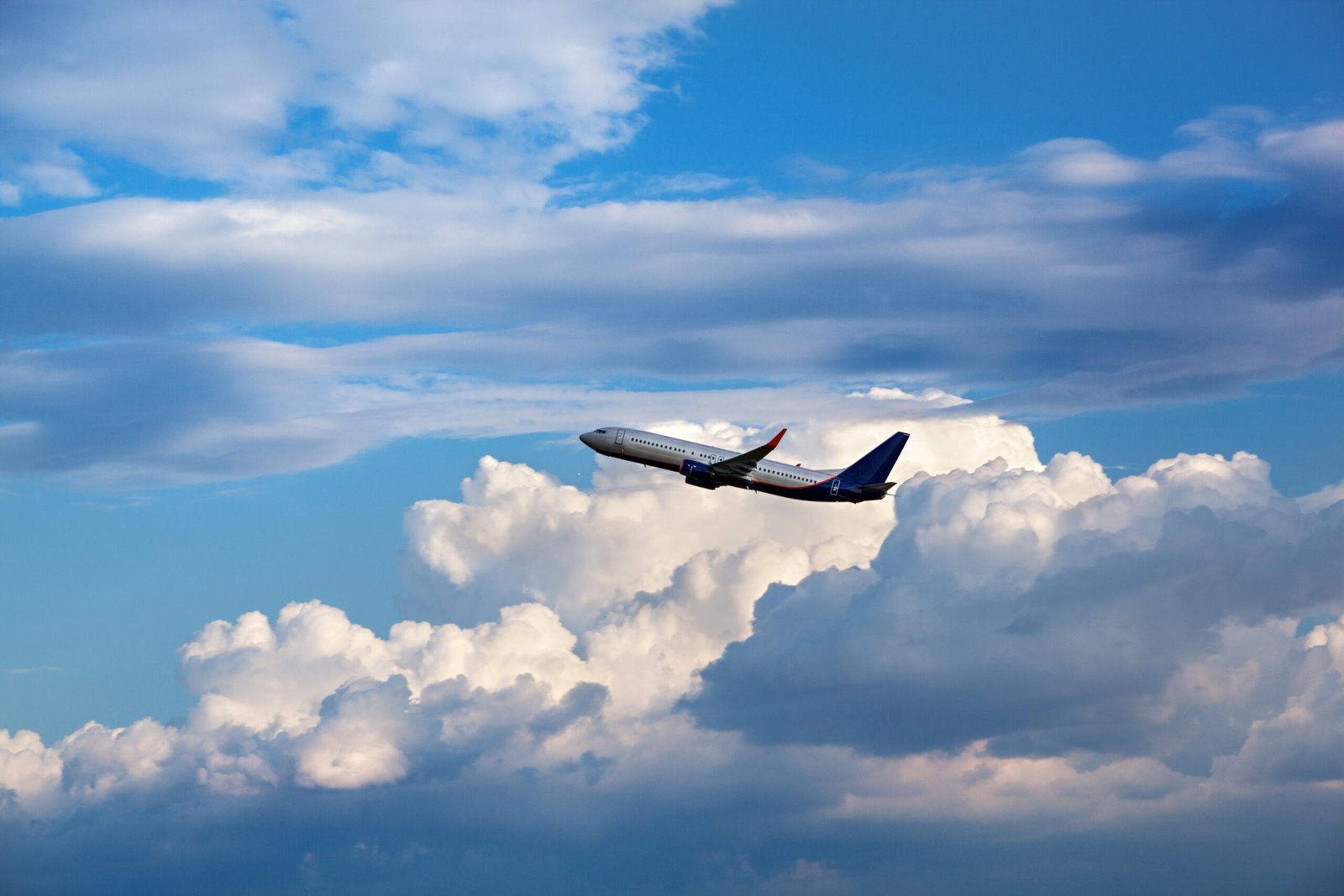poppanew
Wings of Change: How Aviation Is Revolutionizing Global Travel
In an era where the world seems to shrink with every technological advancement, aviation stands as a beacon of innovation and efficiency in global travel. The advent of new training programs, the growth of drone technology, and the expanding role of aviation brokers and insurance companies are reshaping how we navigate the skies. Let’s dive deeper into how these elements are not just enhancing the aviation landscape but also influencing careers and safety standards.

One cannot discuss the evolution of aviation without highlighting the burgeoning field of pilot and remote-controlled (RC) drone training. As air travel becomes more integral to our lives, there is a pressing need for skilled professionals who can operate aircraft safely and efficiently. Flight schools across the globe have ramped up offerings, introducing comprehensive programs that cater to aspiring pilots as well as those interested in mastering drone technology.
Pilot training has become more accessible than ever. Many institutions provide flexible schedules, allowing students to balance their education with personal commitments. In addition to traditional flight schools, online courses have emerged, enabling aspiring aviators to grasp theoretical concepts from anywhere in the world. Moreover, hands-on flight training programs are tailored to simulate real-world scenarios, ensuring that future pilots are equipped with essential skills before they take flight on their own.
For those captivated by drones, specialized RC drone training programs have surged in popularity. As businesses increasingly integrate drones into their operations—from agriculture to cinematography—qualified operators are in high demand. These courses often encompass everything from basic piloting techniques to advanced aerial photography tactics, ensuring participants gain a nuanced understanding of this rapidly evolving field.
However, it’s not just about training; reviewing flight programs has become critical for prospective students aiming for excellence. Websites and forums dedicated to pilot education allow individuals to share experiences and insights about various schools’ curricula, instructors’ expertise, equipment quality, and overall program satisfaction. Such transparency empowers future aviators to make informed decisions about where they invest their time and money.
Shifting gears from individual training paths to broader industry dynamics brings us to aviation brokers and insurance companies—key players in maintaining safety standards within this expansive sector. As air traffic increases worldwide, so do concerns regarding liability and risk management. Brokers specialize in navigating complex insurance landscapes for both commercial airlines and private pilots alike.
The role of these brokers extends beyond mere transactions; they serve as consultants who help clients understand coverage options tailored specifically for their needs—from hull coverage on aircrafts to liability protections against third-party claims during flights or ground operations. With customized solutions becoming commonplace due to varying operational requirements across different regions or types of flights (commercial versus private), having knowledgeable brokers can significantly enhance an operator’s peace of mind.
Furthermore, insurance rates fluctuate based on numerous factors including flying experience, type of aircraft operated, geographic location—and even economic conditions that affect general market trends. Understanding these intricacies ensures that both seasoned pilots and newcomers can secure reasonable premiums while safeguarding against unforeseen events.
In conclusion, as we soar into a new age defined by innovations in pilot education and advancements in drone technology alongside professional guidance from aviation brokers—it’s clear that global travel is being revolutionized one flight at a time. The wings of change are not merely lifting planes but also propelling careers forward while ensuring safety remains paramount throughout this exhilarating journey through the skies.
The Future of Flight: Innovations Reshaping the Skies
As we soar into a new era of aviation, the skies are becoming increasingly populated with innovative technologies and training programs that promise to reshape the future of flight. From aspiring pilots to drone enthusiasts, today’s aviation landscape is teeming with opportunities for growth and exploration. Let’s take a closer look at some of these transformative trends.
*Pilot & RC Drone Training for Careers**
The demand for skilled pilots has never been greater. With advancements in technology and an increasing number of commercial airlines expanding their fleets, the need for trained professionals is reaching new heights. Traditional flight training schools continue to play a vital role in cultivating talent, focusing on everything from foundational knowledge to advanced maneuvering techniques. However, the introduction of remote-controlled (RC) drones is adding an exciting twist to pilot training.
Drone technology is not just a hobby; it’s becoming essential across various industries including agriculture, real estate, and even search-and-rescue operations. Many flight schools are now incorporating specialized programs designed to teach students how to operate these unmanned aerial vehicles safely and effectively. These courses provide hands-on experience with cutting-edge equipment while also emphasizing regulatory compliance and safety protocols.
For those looking to enter this dynamic field, investing in quality training can be a game-changer. Enrolling in reputable programs that offer simulator time alongside real-world flying experiences equips aspiring aviators with skills that are highly sought after by employers.
*Flight Training Program Reviews**
Choosing the right flight training program can be overwhelming given the myriad options available today. Each school boasts unique methodologies, benefits, and costs associated with their curricula. To help navigate these choices, prospective pilots should consider reviews from past students as invaluable resources.
Flying schools often differ in their teaching styles—some may focus on intensive one-on-one instruction while others might offer group classes or online modules. Reading up on student testimonials can unveil insights into instructors’ expertise, fleet conditions, and overall satisfaction levels within each program.
For instance, some institutions provide state-of-the-art simulators that mimic real flying conditions nearly flawlessly—this can significantly enhance learning outcomes without putting students at risk during initial phases of training. Additionally, programs that allow flexibility in scheduling often cater better to working adults or those juggling multiple commitments.
Ultimately, individuals should seek out accredited programs recognized by aviation authorities; this ensures they receive education that meets industry standards while positioning them favorably for future employment opportunities.
*Aviation Brokers and Insurance Companies and Rates**
As the aviation sector continues to expand rapidly, understanding the roles of aviation brokers and insurance companies becomes crucial for both pilots and aircraft owners alike. Brokers serve as intermediaries who facilitate transactions between buyers and sellers or assist clients in finding insurance solutions tailored specifically to their needs.
Purchasing an aircraft—or even renting one—often entails navigating complex regulations and financial implications; that’s where experienced brokers shine through their expert knowledge of market rates and trends. They simplify this process by offering valuable insights into pricing dynamics which can vary significantly based on factors like aircraft type or intended use.

Similarly, securing adequate insurance coverage is paramount for all aviation endeavors; it protects against potential liabilities while providing peace of mind during flights. Rates fluctuate based on numerous variables including pilot experience levels and operational history—thus engaging with knowledgeable insurers helps ensure you find appropriate coverage at competitive prices.
In conclusion, as innovations continue reshaping our skies—whether through enhanced pilot training methods or advances in drone technology—the future seems brighter than ever for those eager to embark on careers within aviation’s diverse realms. By staying informed about emerging trends such as broker services or comprehensive insurance options—aviation enthusiasts can confidently navigate this exhilarating journey ahead!
A Journey Through Time: The Evolution of Aircraft Design
The world of aviation is a fascinating tapestry woven from innovation, ambition, and relentless pursuit of the skies. From the Wright brothers’ first powered flight in 1903 to today’s advanced drones, aircraft design has undergone a remarkable transformation. As we delve into this journey through time, we’ll explore not only the evolution of aircraft but also the paths available for aspiring aviators and the intricacies surrounding aviation brokers and insurance.

In recent years, pilot training has evolved dramatically alongside technology. Traditional flight schools offer comprehensive programs that prepare students for careers as commercial pilots or private operators. These institutions blend theoretical knowledge with practical experience, teaching everything from basic aerodynamics to complex navigation techniques. However, an exciting option has emerged: remote-controlled (RC) drone training. As UAVs (unmanned aerial vehicles) become increasingly prevalent across industries—from agriculture to cinematography—the demand for skilled operators is skyrocketing.
Training programs focused on RC drones are tailored to equip individuals with essential skills like understanding airspace regulations and mastering flight controls. Many organizations now offer certifications that can significantly boost one’s employability in this burgeoning field. Moreover, these courses provide invaluable hands-on experience with cutting-edge technology, preparing students not just for piloting but also for roles in drone maintenance and operations management.
For those considering traditional pilot pathways, reviews of flight training programs can be incredibly informative. Prospective students often seek insights into various institutions’ curricula, instructor qualifications, and overall success rates in helping graduates secure employment after completion. Reputable schools frequently receive accolades for their state-of-the-art simulators and well-maintained fleets—integral components that enhance learning experiences.
Moreover, peer reviews on platforms like aviation forums or dedicated educational websites provide firsthand accounts of student experiences within these programs. Such testimonials can help navigate choices in what might be a significant investment in both time and finances—a crucial factor given the soaring costs associated with obtaining a pilot’s license today.
As we soar higher into the industry’s complexities, we encounter aviation brokers and insurance companies—two pillars that support this vast ecosystem. Brokers play an essential role by connecting buyers with aircraft sellers while navigating the often convoluted marketplace filled with varying prices and specifications. Their expertise simplifies transactions for potential owners by offering valuable insights into market trends and aircraft valuations.

Equally important are insurance companies specializing in aviation coverage. Securing appropriate insurance is vital for both private owners and commercial enterprises alike; it safeguards against unforeseen circumstances ranging from mechanical failures to accidents during operation—after all, safety should always remain paramount in aviation endeavors.
Insurance rates fluctuate based on numerous factors: type of aircraft, intended use (private vs commercial), pilot experience levels, geographical location—all contributing elements that brokers must assess thoroughly to find suitable policies at reasonable rates. Understanding these nuances can empower pilots and owners alike when making informed decisions about their coverage options.
In closing, the evolution of aircraft design mirrors advancements across multiple domains within aviation—from pioneering flights to modern drone applications—and highlights how far we’ve come as a society committed to conquering the skies. With robust training programs paving pathways for new aviators alongside supportive networks of brokers and insurers ensuring safe operations, one can only imagine where our journey will take us next!
Aviation Adventure: Exploring the World’s Most Unique Airports
In the grand tapestry of aviation, unique airports weave a story that stretches far beyond mere transportation. They are gateways to adventure and excitement, offering travelers more than just a place to land. But before one can embark on such journeys, there are essential steps to consider in the aviation industry—like pilot training, flight program evaluations, and understanding the role of brokers and insurance.

First off, let’s delve into Pilot and RC Drone Training for careers. The aviation field has evolved dramatically over recent years, giving rise to numerous opportunities for aspiring pilots and drone enthusiasts alike. Many individuals dream of soaring through the skies but may not realize that a structured training program is key to turning that dream into reality.
Pilot training programs often combine ground school with hands-on flying experience. Students learn about navigation, meteorology, and aircraft systems while also accumulating hours in the cockpit. Meanwhile, Remote Control (RC) drones have carved out their niche within both recreational and commercial markets. From aerial photography to agricultural monitoring, proficiency in drone operation opens up various career paths as well. Individuals interested in this technology can enroll in specialized courses that focus on safety regulations, operational techniques, and even software applications.
As you explore these career avenues, reading Flight Training Program Reviews becomes invaluable. With so many options available—from flight schools boasting state-of-the-art simulators to those offering personalized instruction—it’s crucial to sift through reviews from former students. These testimonials can shed light on what each program excels at or where it might fall short.
For instance, some programs might stand out due to their rigorous curriculum or exceptional instructors who foster hands-on learning experiences. Conversely, others may have a reputation for high costs without delivering commensurate value or support post-graduation. Reading about real experiences can help potential pilots make informed decisions about where they invest their time and money.
Now let’s shift gears towards another vital aspect of aviation: navigating the world of Aviation Brokers and Insurance Companies along with understanding rates involved in this sector. If you’re considering purchasing an aircraft or securing coverage for your aviation endeavors, working with a knowledgeable broker can be beneficial.
Aviation brokers serve as intermediaries between buyers and sellers while providing guidance throughout the transaction process—whether buying new or used planes or negotiating lease agreements. They know how to navigate market fluctuations ensuring you find deals aligned with your needs.
Equally important is understanding insurance options available for aircraft owners or operators; rates can vary significantly depending on factors like aircraft type, usage frequency, pilot experience level, geographical location—the list goes on! Engaging with insurance professionals who specialize in aviation will help demystify your choices while securing adequate coverage tailored specifically for your circumstances.
In conclusion, embarking on an aviation adventure involves much more than simply boarding a flight at one of those remarkable airports around the globe—it starts with foundational training coupled with thorough research into programs designed for success. As you navigate through pilot certification requirements or explore drone operations professionally while seeking assistance from brokers regarding aircraft acquisitions or insurance policies—each step paves the way toward realizing those airborne dreams! So buckle up; your journey into this thrilling world awaits!
Sustainable Skies: How Aviation is Tackling Climate Change
As the world grapples with climate change, the aviation industry stands at a pivotal crossroads. While air travel has historically been a significant contributor to greenhouse gas emissions, innovative approaches are emerging to ensure that the skies above us become more sustainable. From pilot training programs to advancements in drone technology, the aviation sector is not only adapting but also leading the charge toward a greener future.
*Pilot & RC Drone Training for Careers**
One of the most exciting developments in aviation is the rise of remote-controlled (RC) drones, which are increasingly being integrated into various sectors—from agriculture to environmental monitoring. As demand for skilled operators grows, training programs have evolved dramatically. Aspiring aviators now have access to comprehensive courses that blend traditional flight training with cutting-edge drone operations.


Enrolling in a pilot or drone training program can open numerous career pathways. These programs often emphasize sustainability by educating students on eco-friendly flying practices and efficient operational strategies. For instance, drone pilots can help collect data on wildlife populations or inspect power lines without emitting carbon dioxide—this is where technology meets environmental stewardship.
Moreover, many institutions are focusing on incorporating green practices into their curricula. By teaching future aviators about alternative fuels and energy-efficient flying techniques, they cultivate an understanding of how individual actions contribute to broader climate goals.
*Flight Training Program Reviews**
With a plethora of flight schools available today, choosing the right one can be daunting. This decision impacts not only your career trajectory but also your understanding of sustainable aviation practices. When exploring flight training programs, it’s essential to consider their commitment to sustainability.
Many reputable schools now offer specialized courses focused on using biofuels and electric aircraft technologies. Reviews from alumni can provide valuable insights into how well these programs integrate eco-conscious principles into their lessons. Students who graduated from forward-thinking institutions often report feeling equipped not just with piloting skills but also with knowledge about minimizing their carbon footprint in the cockpit.
Additionally, look for schools that prioritize partnerships with airlines committed to sustainability initiatives; this connection will help you gain insight and experience in real-world applications of green technologies during your training journey.
*Aviation Brokers and Insurance Companies and Rates**
Navigating through insurance options as an aviator or drone operator might seem overwhelming at first glance; however, it’s crucial for ensuring safety and compliance within this evolving industry landscape. Aviation brokers play an essential role here by connecting clients with insurance companies offering tailored policies that account for new sustainable practices being adopted across the sector.
Many insurers are beginning to recognize how investments in greener technologies reduce risks associated with climate-related incidents. As a result, some firms may provide lower rates for operators using electric aircraft or engaging in environmentally friendly operations—an encouraging trend reflective of a growing commitment towards sustainability within underwriting models.
In conclusion, while aviation faces significant challenges related to climate change, proactive measures taken by pilot training institutions, innovative flight school curricula, and responsive insurance markets create opportunities for positive transformation within this vital industry. The skies may be vast and daunting at times; however, as we embrace new technologies and foster eco-consciousness among future aviators today, we pave a path towards truly sustainable skies tomorrow—the kind where every flight contributes positively rather than negatively to our planet’s health.




